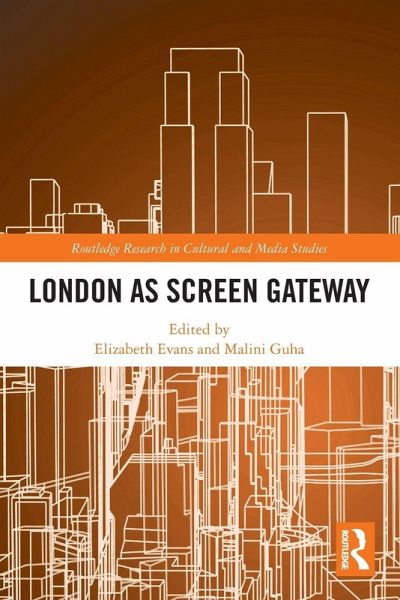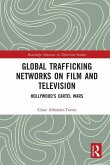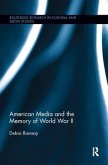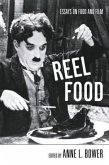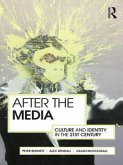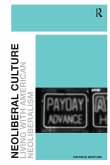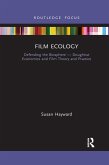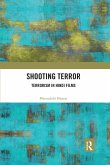London as Screen Gateway
Herausgeber: Evans, Elizabeth; Guha, Malini
London as Screen Gateway
Herausgeber: Evans, Elizabeth; Guha, Malini
- Broschiertes Buch
- Merkliste
- Auf die Merkliste
- Bewerten Bewerten
- Teilen
- Produkt teilen
- Produkterinnerung
- Produkterinnerung
London as Screen Gateway explores how London features within screen narratives and as a location of screen industry activity.
Andere Kunden interessierten sich auch für
![Global Trafficking Networks on Film and Television Global Trafficking Networks on Film and Television]() César Albarrán-TorresGlobal Trafficking Networks on Film and Television59,99 €
César Albarrán-TorresGlobal Trafficking Networks on Film and Television59,99 €![American Media and the Memory of World War II American Media and the Memory of World War II]() Debra RamsayAmerican Media and the Memory of World War II58,99 €
Debra RamsayAmerican Media and the Memory of World War II58,99 €![Reel Food Reel Food]() Reel Food52,99 €
Reel Food52,99 €![After the Media After the Media]() Peter BennettAfter the Media60,99 €
Peter BennettAfter the Media60,99 €![Neoliberal Culture Neoliberal Culture]() Patricia VenturaNeoliberal Culture71,99 €
Patricia VenturaNeoliberal Culture71,99 €![Film Ecology Film Ecology]() Susan HaywardFilm Ecology30,99 €
Susan HaywardFilm Ecology30,99 €![Shooting Terror Shooting Terror]() Meenakshi BharatShooting Terror61,99 €
Meenakshi BharatShooting Terror61,99 €-
-
-
London as Screen Gateway explores how London features within screen narratives and as a location of screen industry activity.
Hinweis: Dieser Artikel kann nur an eine deutsche Lieferadresse ausgeliefert werden.
Hinweis: Dieser Artikel kann nur an eine deutsche Lieferadresse ausgeliefert werden.
Produktdetails
- Produktdetails
- Verlag: Taylor & Francis
- Seitenzahl: 256
- Erscheinungstermin: 28. November 2024
- Englisch
- Abmessung: 234mm x 156mm x 14mm
- Gewicht: 386g
- ISBN-13: 9781032197968
- ISBN-10: 103219796X
- Artikelnr.: 71913578
- Herstellerkennzeichnung
- Libri GmbH
- Europaallee 1
- 36244 Bad Hersfeld
- gpsr@libri.de
- Verlag: Taylor & Francis
- Seitenzahl: 256
- Erscheinungstermin: 28. November 2024
- Englisch
- Abmessung: 234mm x 156mm x 14mm
- Gewicht: 386g
- ISBN-13: 9781032197968
- ISBN-10: 103219796X
- Artikelnr.: 71913578
- Herstellerkennzeichnung
- Libri GmbH
- Europaallee 1
- 36244 Bad Hersfeld
- gpsr@libri.de
Elizabeth Evans is Professor of Screen Cultures at the University of Nottingham. Her research examines the intersection of screen audiences, screen industries and technology studies. She is the author of Transmedia Television: Audiences, New Media and Daily Life (2011) and Understanding Engagement in Transmedia Culture (2020) and co-editor of Participations: The Online Journal of Audience and Reception Studies. Malini Guha is Associate Professor of Film Studies at Carleton University. As a contributing editor for the online journal Mediapolis, she writes a regular column, 'Screening Canada', where she explores an aspect of Canada's mediated place-making in relation to recent issues concerning its global role and domestic negotiation of racial and ethnic difference.
List of Figures
List of Contributors
Introduction
Part I
London as Archive
1. 'The BFI: London's gateway to Cinema and Media studies for all':
Interview with Sarah Currant, Melanie Hoyes, and Emma Smart
2. Millennium Mills: London's last post-industrial ruin and its media
history and industry
3. Sherlock Holmes, Archive London: Phantasms of Authenticity at the
Festival of Britain, 1951
4. Watching the Detectives: Poe, Luther, and the Surveilled City
5. Adaptations and Intertexts: How Disney Imagines London in 'Mary Poppins'
and Saving Mr. Banks
6. The Rough and the Smooth: Touching and the Tactile in British London
Films of the 1920s
Part II
London Locations
7. London Film-Location Walking Tours: Labouring at the intersection of
text, location and place
8. 'Rivers Can Be Very Sinister Places': Alfred Hitchcock Takes a
Satirical, Sinister London Crime Cruise in Frenzy
9. Is London Real? The Actual/Virtual/Fantastic City from Blow-Up to
Bandersnatch
10. London and the carnivalesque in Catastrophe (Channel 4, 2015-2019), and
Fleabag (BBC, 2016 - 2019)
Part III
London and Beyond
11. Leaving London: The BBC, Channel 4 and The Symbolic Diversity of
Location
12. Invisible London: Unveiling the Immigrant Landscape in The Receptionist
13. Piccadilly Lights as Pandemic Portal? The Case of Circa Art's Public
Projection Series
Afterword: Peak London: the spectacular and the banal in the ABC decade
List of Contributors
Introduction
Part I
London as Archive
1. 'The BFI: London's gateway to Cinema and Media studies for all':
Interview with Sarah Currant, Melanie Hoyes, and Emma Smart
2. Millennium Mills: London's last post-industrial ruin and its media
history and industry
3. Sherlock Holmes, Archive London: Phantasms of Authenticity at the
Festival of Britain, 1951
4. Watching the Detectives: Poe, Luther, and the Surveilled City
5. Adaptations and Intertexts: How Disney Imagines London in 'Mary Poppins'
and Saving Mr. Banks
6. The Rough and the Smooth: Touching and the Tactile in British London
Films of the 1920s
Part II
London Locations
7. London Film-Location Walking Tours: Labouring at the intersection of
text, location and place
8. 'Rivers Can Be Very Sinister Places': Alfred Hitchcock Takes a
Satirical, Sinister London Crime Cruise in Frenzy
9. Is London Real? The Actual/Virtual/Fantastic City from Blow-Up to
Bandersnatch
10. London and the carnivalesque in Catastrophe (Channel 4, 2015-2019), and
Fleabag (BBC, 2016 - 2019)
Part III
London and Beyond
11. Leaving London: The BBC, Channel 4 and The Symbolic Diversity of
Location
12. Invisible London: Unveiling the Immigrant Landscape in The Receptionist
13. Piccadilly Lights as Pandemic Portal? The Case of Circa Art's Public
Projection Series
Afterword: Peak London: the spectacular and the banal in the ABC decade
List of Figures
List of Contributors
Introduction
Part I
London as Archive
1. 'The BFI: London's gateway to Cinema and Media studies for all':
Interview with Sarah Currant, Melanie Hoyes, and Emma Smart
2. Millennium Mills: London's last post-industrial ruin and its media
history and industry
3. Sherlock Holmes, Archive London: Phantasms of Authenticity at the
Festival of Britain, 1951
4. Watching the Detectives: Poe, Luther, and the Surveilled City
5. Adaptations and Intertexts: How Disney Imagines London in 'Mary Poppins'
and Saving Mr. Banks
6. The Rough and the Smooth: Touching and the Tactile in British London
Films of the 1920s
Part II
London Locations
7. London Film-Location Walking Tours: Labouring at the intersection of
text, location and place
8. 'Rivers Can Be Very Sinister Places': Alfred Hitchcock Takes a
Satirical, Sinister London Crime Cruise in Frenzy
9. Is London Real? The Actual/Virtual/Fantastic City from Blow-Up to
Bandersnatch
10. London and the carnivalesque in Catastrophe (Channel 4, 2015-2019), and
Fleabag (BBC, 2016 - 2019)
Part III
London and Beyond
11. Leaving London: The BBC, Channel 4 and The Symbolic Diversity of
Location
12. Invisible London: Unveiling the Immigrant Landscape in The Receptionist
13. Piccadilly Lights as Pandemic Portal? The Case of Circa Art's Public
Projection Series
Afterword: Peak London: the spectacular and the banal in the ABC decade
List of Contributors
Introduction
Part I
London as Archive
1. 'The BFI: London's gateway to Cinema and Media studies for all':
Interview with Sarah Currant, Melanie Hoyes, and Emma Smart
2. Millennium Mills: London's last post-industrial ruin and its media
history and industry
3. Sherlock Holmes, Archive London: Phantasms of Authenticity at the
Festival of Britain, 1951
4. Watching the Detectives: Poe, Luther, and the Surveilled City
5. Adaptations and Intertexts: How Disney Imagines London in 'Mary Poppins'
and Saving Mr. Banks
6. The Rough and the Smooth: Touching and the Tactile in British London
Films of the 1920s
Part II
London Locations
7. London Film-Location Walking Tours: Labouring at the intersection of
text, location and place
8. 'Rivers Can Be Very Sinister Places': Alfred Hitchcock Takes a
Satirical, Sinister London Crime Cruise in Frenzy
9. Is London Real? The Actual/Virtual/Fantastic City from Blow-Up to
Bandersnatch
10. London and the carnivalesque in Catastrophe (Channel 4, 2015-2019), and
Fleabag (BBC, 2016 - 2019)
Part III
London and Beyond
11. Leaving London: The BBC, Channel 4 and The Symbolic Diversity of
Location
12. Invisible London: Unveiling the Immigrant Landscape in The Receptionist
13. Piccadilly Lights as Pandemic Portal? The Case of Circa Art's Public
Projection Series
Afterword: Peak London: the spectacular and the banal in the ABC decade

